Southern Resident Killer Whale: Species at Risk recovery
Gulf Islands National Park Reserve
In Canada, Southern Resident Killer Whales live mainly in the waters between Vancouver and Victoria, and off of the west coast of Vancouver Island. Learn more about these endangered animals, what Parks Canada is doing to protect them and actions you can take to help.
Three reasons to love Southern Resident Killer Whales
1. They live in tight knit families

In the Pacific Ocean, Southern Resident Killer Whales spend most of their lives swimming close to their mothers. Chinook Salmon is the preferred food of Southern Resident Killer Whales and some whales even share almost every fish they catch with members of their families.
2. They have a unique culture
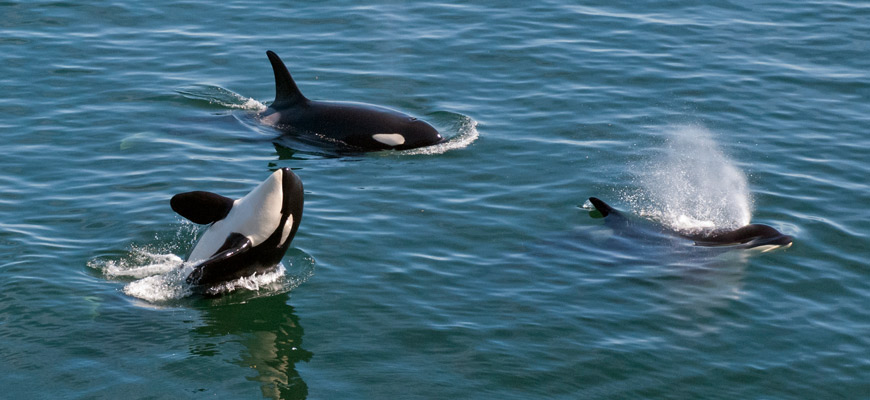
Killer whales live in close-knit communities known as pods, made up of females and their offspring. Each killer whale pod teaches their young which language to speak, what food to eat and how to behave. For example, Southern Resident Killer Whales use distinct calls not used by other groups.
3. They are endangered
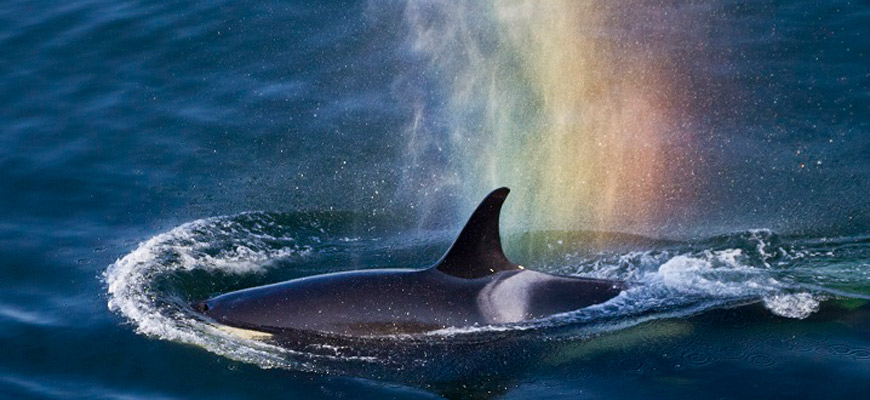
Southern Resident Killer Whales are endangered. They struggle to find enough salmon to eat and they are vulnerable to contaminants. Also, boat disturbance and noise interferes with their ability to find prey and communicate with each other.
Three ways to care for Southern Resident Killer Whales:
1. Watch from shore
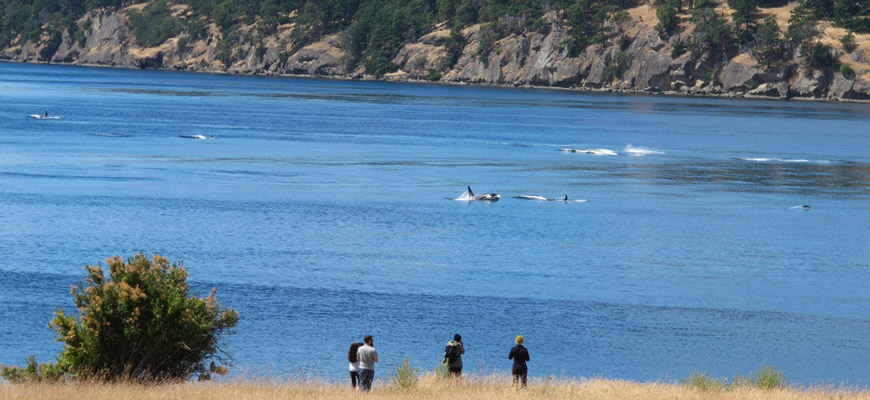
Southern Resident Killer Whales use their hearing rather than their sight to find salmon. This is called echolocation. Engine noise from boats makes it difficult for killer whales to sense their food.
Parks Canada’s action:
At Gulf Islands National Park Reserve, we are joining The Whale Trail, a network of shore-based locations where you can watch whales and other marine mammals along the Pacific coast.
Actions you can take:
- Check out thewhaletrail.org for shore-based whale-watching locations.
- Report your sightings to the BC Cetacean Sightings Network. Download the WhaleReportApp or call 1-866-I-SAW-ONE.
This photo shows park visitors watching whales from a safe location at East Point, Saturna Island in Gulf Islands National Park Reserve. Always know the conditions before you go near the ocean. Be Coast Smart. Learn more here: http://coastsmart.ca/
2. Be a whale-wise boater
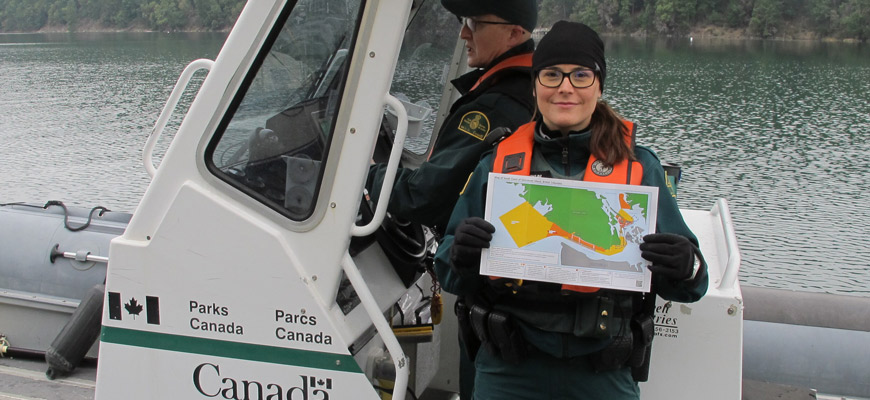
The presence of boats and the noise they make can keep Southern Resident Killer Whales from communicating with their family and can interfere with their search for food.
Parks Canada’s action:
At Gulf Islands National Park Reserve, our park wardens work with colleagues from Transport Canada and Fisheries and Oceans Canada to inform boaters about management measures in place to help the Southern Resident Killer Whales. The wardens also assist in enforcing regulations when they are not being followed.
Action you can take:
Boaters, it’s your responsibility to be informed. How far away should you be from Southern Resident Killer Whales? What are interim sanctuary zones, and where are they?
Learn about Southern Resident Killer Whale management measures
Be Whale Wise
3. Choose sustainable salmon
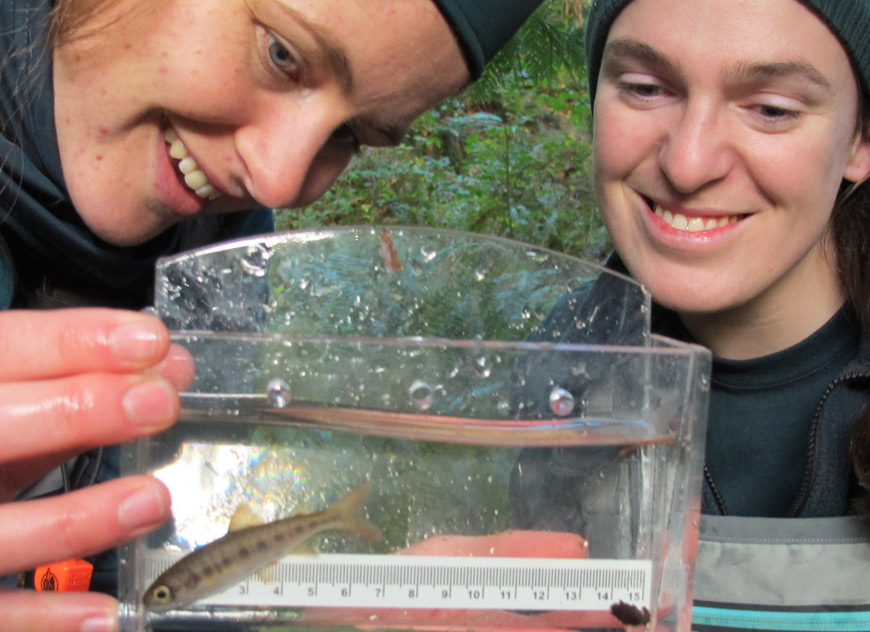
For Southern Resident Killer Whales to recover, we need to protect what they eat. This means conserving salmon habitat, from small streams to the open ocean.
Parks Canada’s action:
Parks Canada’s network of protected areas plays an important role in protecting and restoring healthy, resilient ecosystems and contributing to the recovery of species at risk.
At Gulf Islands National Park Reserve, we protect the Lyall Creek watershed on Saturna Island and monitor juvenile salmon in the creek every fall. Lyall Creek is home to Coho Salmon and Chum Salmon, which Southern Resident Killer Whales eat to supplement their preferred diet of Chinook Salmon.
Action you can take:
Choose the salmon you eat based on sustainable seafood guidelines such as Ocean Wise. Learn more here.
Boaters, it’s your responsibility to be informed. Please be aware of commercial and recreational fishing regulations. When and where can you fish, and what can you catch?
Discover the story of how many people worked to restore Lyall Creek in the park reserve.
Learn more about Southern Resident Killer Whales and species at risk recovery.
- Species-at-Risk Registry (Southern Resident Killer Whale profile)
- Species at Risk Recovery: Gulf Islands National Park Reserve
- Southern Resident Killer Whale Research Project in Gulf Islands National Park Reserve
- Boating around Killer Whales in Coastal BC - Give them space
- Field Notes: Recovering Southern Resident Killer Whales
*All Southern Resident Killer Whale photos on this webpage were taken from shore with a wildlife camera at East Point, Saturna Island, Gulf Islands National Park Reserve.
- Date modified :